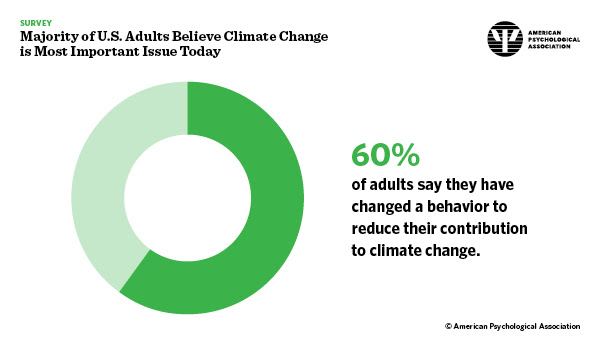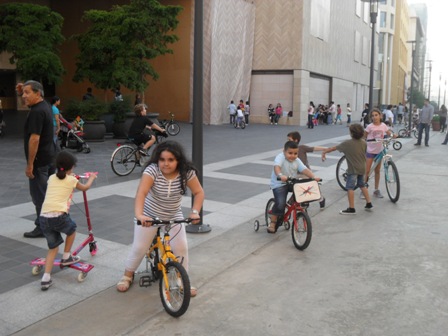As the effects of climate change become more evident, and more awareness to it is felt, more than half of U.S. adults (56%) say climate change is the most important issue facing society today, yet 4 in 10 have not made any changes in their behavior to reduce their contribution to climate change, according to a new poll by the American Psychological Association.
This is an important survey to note, because it will implicated how the western east areas of the world, countries like Turkey, Lebanon, Israel, Egypt, Jordan, Syria will follow. There is about a 10 year lag, but we hope the writing is on the wall and enough people will wake up to the real threats that come from fossil fuels and cheap products made in China.
While 7 in 10 say they wish there were more they could do to combat climate change, 51% of U.S. adults say they don’t know where to start. The survey was conducted online from Dec. 12-16, 2019, by The Harris Poll on behalf of the American Psychological Association.

People are taking some steps to combat climate change, with 6 in 10 saying they have changed a behavior to reduce their contribution to climate change.
Nearly three-quarters (72%) say they are very or somewhat motivated to make changes.
Among those who have already made behavior changes to reduce their contribution to climate change, when asked why they have not done more, 1 in 4 (26%) cite not having the resources, such as time, money or skills, to make changes. Some people are unwilling to make any changes in their behavior to reduce their contribution to climate change.
When those who have not changed their behavior were asked if anything would motivate them to reduce their contribution to climate change, 29% said nothing would motivate them to do so.
Climate change fears affects mental health, mainly the younger ones
Concern about climate change may be having an impact on mental health, with more than two-thirds of adults (68%) saying that they have at least a little “eco-anxiety,” defined as any anxiety or worry about climate change and its effects.
These effects may be disproportionately having an impact on the country’s youngest adults; nearly half of those age 18-34 (47%) say the stress they feel about climate change affects their daily lives.
Psychological research shows us that when people learn about and experience local climate impacts, their understanding of the effects of climate change increases.
A quarter of those who have not yet made a behavior change to reduce their contribution to climate change say personally experiencing environmental impacts of climate change (e.g., natural disasters, extreme weather conditions) (25%) or seeing environmental impacts of climate change in their community (24%) would make them want to try to reduce their contribution to climate change.
Take action to relieve the eco-anxiety
The most common behavior changes people have already made or are willing to make include:
- reducing waste, including recycling (89%);
- upgrading insulation in their homes (81%)
- limiting utility use in their homes (79%)
- using renewable energy sources, such as solar panels or purchasing electricity from a renewable energy supplier (78%)
- consuming less in general (77%)
- or limiting air travel (75%)
Public transport, vegans, bike paths, farmer’s markets wanted

Bike path in Beirut, more paths wanted please say Americans. What about us western easterners?
Adults are less likely to say they have changed or are willing to change daily transportation habits (e.g., carpool, drive an electric or hybrid vehicle, use public transportation, walk or bike) (67%) or their diet (e.g., eat less red meat or switch to a vegetarian or vegan diet) (62%).
A majority (70%) also say that they have already or are willing to take action such as working with their community to reduce emissions, for example by installing bike paths, hosting farmers markets, or using community solar panels.
And nearly 6 in 10 (57%) say that they have already or are willing to write or lobby elected officials about climate change action with a similar proportion (57%) saying they already have or are willing to join an organization or committee working on climate change action.
The most common motivations for behavior changes among those who have taken action to reduce their contribution to climate change are wanting to preserve the planet for future generations (52%), followed by hearing about climate change and its impacts in the news (43%).
This survey was conducted online within the United States by The Harris Poll on behalf of APA from Dec.12 – 16, 2019, among 2,017 U.S. adults ages 18 and older.




